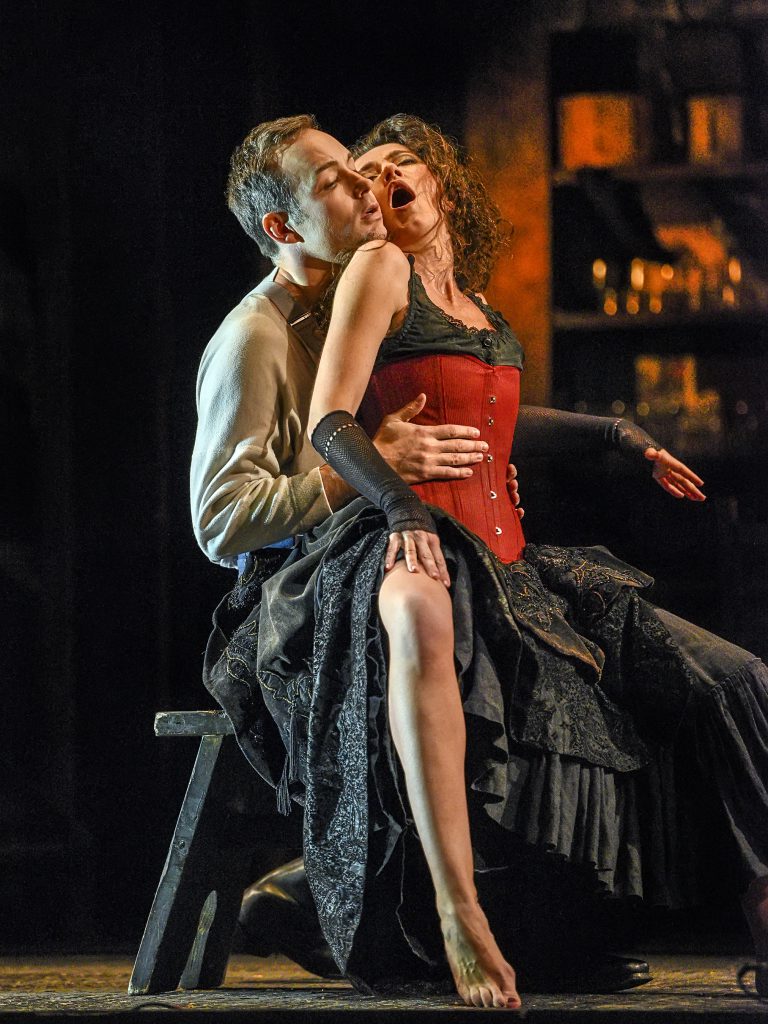d’Oustrac’s brilliant Carmen provides the highlights at Dallas Opera

Stéphanie d’Oustrac and Stephen Costello star in Bizet’s “Carmen” at Dallas Opera. Photo: Karen Almond
Dallas Opera’s Carmen proved to be a winning marriage of visual drama, the human voice, and the orchestra—a nearly perfect presentation of Bizet’s timeless tale of erotic obsession.
Even in the opening phrases of the Overture Friday night at the Winspear Opera House, conductor Emmanuel Villaume’s command of the nuance and unique musical language of Bizet signaled an outstanding performance in the making. Villaume made the orchestra “sing” with the inflections of the French language, while meticulously exploring Bizet’s subtle counterpoint and instrumental colors.
Throughout, the orchestra played its part magnificently, underlining emotions of the characters and often emerging as a sort of Greek chorus, commenting on the profound sequence of events on the stage. The famous entr’acte before Act III, with its naked introduction for flute and harp, was particularly hypnotic, evoking the barren wilderness.
Mezzo-soprano Stéphanie d’Oustrac sang the title role with a gorgeous, multi-faceted voice, ranging from dusky and dark to pristine clarity. (Among other dramatic and vocal tricks, she delivered her opening aria, “L’amour est un oiseau rebelle,” while apparently eating an orange.)
Dramatically, she conveyed an entrancingly multi-faceted Carmen—not an id-driven seductress, but a woman motivated by a deep love for Don Jose. Her Carmen eagerly prepared, almost schoolgirl-like, for his arrival in Act II, and seemed genuinely heartbroken by his impulse to place duty over love. Even in the final scene, she conveyed not just the famous bravery and boldness of Carmen, but the vulnerability as well, becoming almost as crazed with love and doubt as Don Jose.
D’Oustrac’s principal colleagues supported adequately but never quite emerged as her equal. Tenor Stephen Costello acted the part of the conflicted Don Jose convincingly, but with little nuance in his vocal delivery; he was at his best in the violent final scene, finding some musical freedom in the wide range of emotions in this section.
Russian bass Alexander Vinogradov loomed large dramatically as the toreador Escamillo, with a grandly loud voice that likewise wanted a bit more nuance. Soprano Sara Gartland brought a rich tone quality to the role of Micaëla, and her performance of “Je dis que rien ne m’epouvante” presented an impressively sustained rise and fall of intensity; however, her volume level was, unlike Vinogradov’s, under- rather than over-nourished.
Among the comprimario roles, bass Ben Wager was threateningly bully-like as Zuniga, and baritone Gideon Dabo, tenor Rafael Moras, and baritone Corey Crider were appropriately gangsterish as Moralès, Le Remendado, and Le Dancaïre. Sopranos Sarah Tucker and Lindsay Metzger brought aggressive drama and musicality to the roles of Carmen’s companions Frasquita and Mercédès.
The 2004 production, created by David McVicar for the Glyndebourne Festival, features bleak sets by Michael Vale. Act I suggested a late 19th-century slum in an industrial urban setting, while Act III was set on a dark, empty stage, depicting mountainous open country. The first three acts were colored with drab grays and browns reminiscent of antique photography (at the same time allowing a dash of red in Carmen’s attire). After all this darkness, the final act burst open with almost blinding light and color.
Revival director Jack Furness highlighted the constantly fluid relationships and personalities of the opera. The costumes by Sue Blane (who designed the costumes for the original Rocky Horror Picture Show in 1975) ranged eclectically from late 19th-century attire to Spanish traditional costumes to Prohibition-era mob wear, subtly communicating the timelessness of the tale.
The Dallas Opera Chorus, trained by Alexander Rom, was particularly strong in this performance, with appealing street-urchin performances from a children’s chorus trained by Meredith Wallace. As with all other elements of the performance, the choreography created by Andrew George for Gothenberg and here re-created by Andrzej Glasniak contributed to the swirl of humanity so beautifully depicted in this production.
The Dallas Opera production of Carmen runs through November 4. dallasopera.org; 214-443-1000.